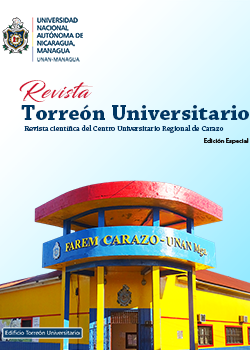Modelo alternativo para evaluar aprendizajes en inglés como lengua extranjera
DOI:
https://doi.org/10.5377/rtu.v1i1.19065Keywords:
Evaluación de aprendizajes, evaluación alternativa, inglés, teoría de las inteligencias múltiples, porfolio de evaluaciónAbstract
The assessment of knowledge is an inseparable process from the teaching-learning process; This fundamental element is examined in this study through the application of the Theory of Multiple Intelligences and the use of the portfolio as a tool for an alternative assessment. The participants were first-year English students and professors who teach Integral English at the Regional Multidisciplinary Faculty of Carazo (FAREM-Carazo) of the National Autonomous University of Nicaragua, Managua (UNAN-Managua).
The objectives of this research are to analyze the impact of an application plan of the Theory of Multiple Intelligences (TMI) in the assessment of learning in the subject of Integral English and to evaluate the impact of an alternative assessment model based on the methodology of the learning portfolio. This study adopted a mixed approach, using qualitative and quantitative tools, with a predominant emphasis on the qualitative, as well as being a case study.
The results of this research were positive, as English teachers showed a genuine interest in changing the current paradigm of assessment of learning in the comprehensive English class and applying the proposal of the new assessment model. Students expressed satisfaction with the new way of assessing their learning. The implementation of this new assessment model demonstrates the impact it has on the perception of each student and teacher about the true function of learning assessment.
Downloads
184
References
Aburto, P. (junio-septiembre 2014). Análisis de la evaluación educativa y su relación con la planificación docente y el rendimiento académico estudiantil durante el primer semestre del año 2008.En revista Torreón Universitario. Número 7. http://revistasnicaragua.net.ni/index.php/torreon/search/search
Armstrong, T. (2000). Inteligencias múltiples en el aula: guía práctica para educadores. https://books.google.com.ni/books?id=cD6d28L-1HAC&printsec=frontcover&dq=Armstrong,+T.+(2000):+Multiple+Intelligences+in+the+Classroom.&hl=es-419&sa=X&ved=0ahUK Ewi8qarb1LHcAhWRtlkKHcT0B584C hDoAQgrMAk#v =onepage&q&f=false
Armstrong, T. (2006). Inteligencias múltiples en el aula: guía práctica para educadores. https://www.orientacionandujar.es/wp-content/uploads/2015/05/Armstrong-2.pdf
Brown, D. (2004). Language assessment: Principles and classroom practices. San Francisco States. Longman.
Gallego, S. (2009). La teoría de las inteligencias múltiples en la enseñanza-aprendizaje del español como lengua extranjera. [Tesis de doctorado Universidad de Salamanca ] https://gredos.usal.es/jspui/bitstream/10366/76442/1/DLE_Gallego_Gonzalez_S_Lateoriadelasinteligencias.pdf
Gardner, H. (1994). Estructuras de la mente: la teoría de las inteligencias múltiples. https://ebookcentral.proquest.com
Gómis, N. (2007). Evaluación de las inteligencias múltiples en el contexto educativo a través de expertos, maestros y padres. [Tesis de doctorado Universidad de Alicante ] https://rua.ua.es/dspace/bitstream/10045/9538/1/tesis_doctoral_nieves_gomis.pdf
Hernández, R. Collado, C., y Baptista, M. (2010). Metodología de la investigación. México: McGraw-Hill Educación.
Jorba, J. y Sanmartí, N. (1993,2008). La función pedagógica de la evaluación. http://www.seg.guanajuato.gob.mx/Ceducativa/CartillaB/6antologia/Referentes%20para%20la%20evaluaci%C3%B3n/Sobre%20estrategias%20y%20herramientas%20para%20llevar%20a%20cabo%20evaluaci%C3%B3n%20f/Jorba,%20Jaume%20y%20S.%20Neus.pdf
Little, D. y Perclová, R. (2003). El portafolio Europeo de las lenguas: guía para profesores y formadores de profesores. http://deniscousineau.pbworks.com/f/teachersguide_revised.pdf
Mateo, J. (2000) La evaluación educativa, sus prácticas y otras metáforas. https://web.ua.es/es/ice/documentos/recursos/materiales/la-evaluacion-educativa.pdf
Montaño, A. (Ed.). (2013). Tuning America Latina: Reflexiones y perspectivas en educación. Editorial IPAR.
Prieto. E. y Domínguez. G. (2016). Modelos y paradigmas de educación. Su aplicación a un diseño de intervención educativa.
Rodríguez, R. Universidad Nacional Autónoma de Nicaragua. 08 de agosto de 2019. http://www.unan.edu.ni/index.php/relevantes/sistema-educativo-evaluara-aprendizajes-por-competencias.odp
Salinas, B. (2007). La evaluación de los estudiantes en la educación superior. Apuntes de buena prácticas. http://www3.uji.es/~betoret/Formacion/Evaluacion/Documentacion/La%20evaluacion%20estudiantes%20en%20la%20ESuperior%20UV.pdf
Valverde, X. (febrero-mayo 2016). Estilos de aprendizajes como eje esencial para construir un modelo constructivista e innovador en la evaluación de aprendizajes en la facultad regional multidisciplinaria de Carazo. En Revista Torreón Universitario. Número 12. file:///C:/Users/user-pc/Downloads/2631-Texto%20del%20art%C3%ADculo-4224-1-10-20161215.pdf
Downloads
Published
How to Cite
Issue
Section
License
Copyright (c) 2024 National Autonomous University of Nicaragua, Managua

This work is licensed under a Creative Commons Attribution-NonCommercial-NoDerivatives 4.0 International License.
Los autores que publican en esta revista están de acuerdo con los siguientes términos.
- El autor o los autores de los artículos, ensayos o investigaciones conceden a la Universidad Nacional Autónoma de Nicaragua, Managua (UNAN-Managua) los derechos de edición (copyright) del trabajo enviado, por consiguiente la Universidad cuenta con el derecho exclusivo para publicar el artículo durante el periodo completo de los derechos de autor.
- Estos derechos de autor/ autores autorizan a la Revista Torreón Universitario y a la Universidad editar y divulgar/publicar el artículo en dicha Revista, incluyendo reproducción impresa y electrónica, el almacenamiento, recuperación y cualquier otro tipo de publicación, y fuentes de información secundaria como servicios de resúmenes y bases de datos, así mismo la facultan a proteger el artículo contra el uso no autorizado para su difusión por medios impresos o electrónicos (PDF, HTML, EPUB, XML u otros).
Licencia para el uso del contenido
La revista hace uso de la Licencia Creative Commons Atribución-NoComercial-SinDerivar 4.0 Internacional.
Bajo esta declaración:

Este revista está sujeta a una licencia de Creative Commons Reconocimiento-NoComercial-SinObraDerivada 4.0 Internacional. Puede ser copiada, distribuida y transmitida públicamente siempre y cuando se cite al autor y la fuente (Revista Torreón Universitario), no debe modificarse ni utilizarse con ningún fin comercial. La licencia completa se puede consultar en http://creativecommons.org/licenses/by-nc-nd/4.0/.



